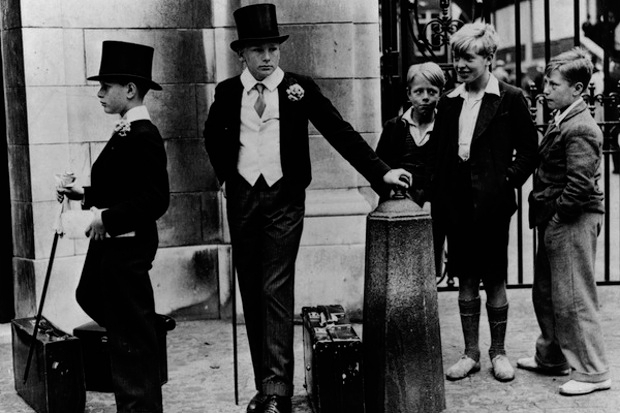From The Spectator, 10 October 1914:
As we go on in life we do, as a rule, learn our place more or less truly, and we find it is not the one we should have chosen. It may not be lower, but it is almost certainly different from what we expected. As we look over the lists of life’s examinations we may find that in some subjects we have done better than we expected. In such-and-such a bad situation we came out fairly well perhaps. We showed judgment, or initiative, or endurance, or even self-sacrifice. But, good heavens, what an effort it was! and how nearly we failed! What a little there was to choose between us and some one who has found his own place much lower down! There is a great deal of luck in the whole thing, and men sink into their own place too tired to enjoy the fact that it is not a very low one. On the other hand, we may find ourselves in a far lower place than we imagined. We may come to realize that we have mistaken ourselves and done far less well than we thought we should. Do many people overrate themselves morally? It is difficult to judge, because there are no data. Few people praise themselves openly, and there is a modesty which screens humility as effectually as it precludes boasting. Intellectually, an immense number of people are altogether ignorant of their own place, and rate themselves absurdly high. A good use of words deceives many. The critical faculty, again, is a great cause of deception. Some men and more women recognize a fool in an instant, and can make a good guess at the intellectual place of almost every man or woman they come into close contact with. From this fact they argue that their own ability is great. Often it is not, or, if we must admit them to be able, it may be ability shorn of all initiative and all force, and not really much worth having. Those women—and they are not very many—who claim intellectual deference claim it generally on these grounds, and claim far too much.
The saddest thing we ever have to learn about our own place is that it is not an essential one. So far as a man’s work goes, this is, of course, the stalest of truisms, yet it is, like many stale truisms, a cause of ever-fresh pain. In the smaller world of their domestic surroundings, most men and most women believe themselves at some time in their lives to be essential, to occupy a place which could not be filled. There may come a time when they must realize that this is true no longer. They fill no essential place, not even the humblest. Those whom the gods love often do not live to learn this last lesson. The knowledge comes through sad events and through happy ones. Deaths teach it; the mere passage of the years teaches it. It is an awful piece of knowledge. Most of us, if we bad our choice, would rather live in a fool’s paradise for ever than be brought face to face with this truth. But a large proportion of people as they get older have to face it willy-nilly. It is the first death—whatever moral significance Holy Writ may give to the second.





Comments